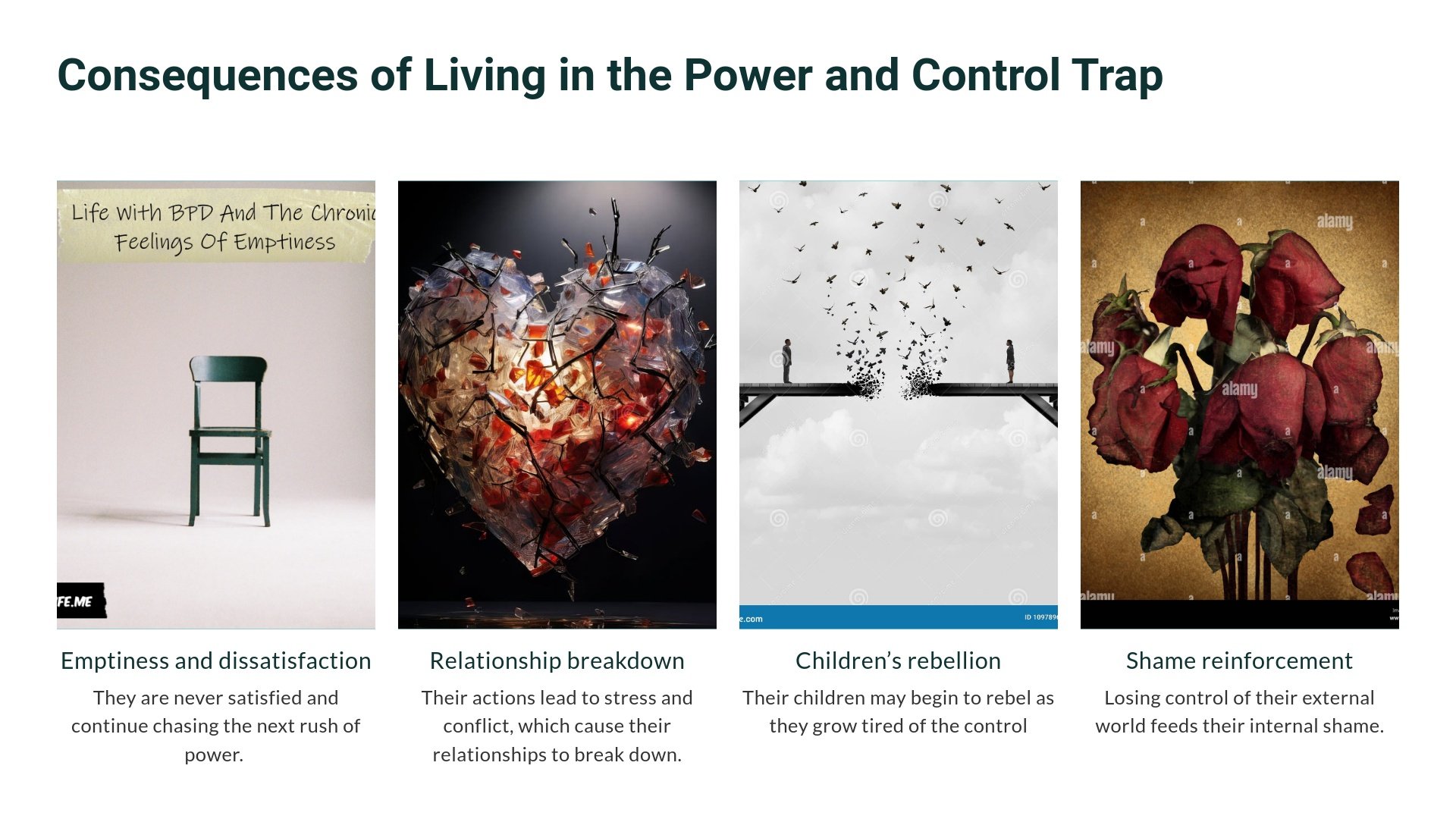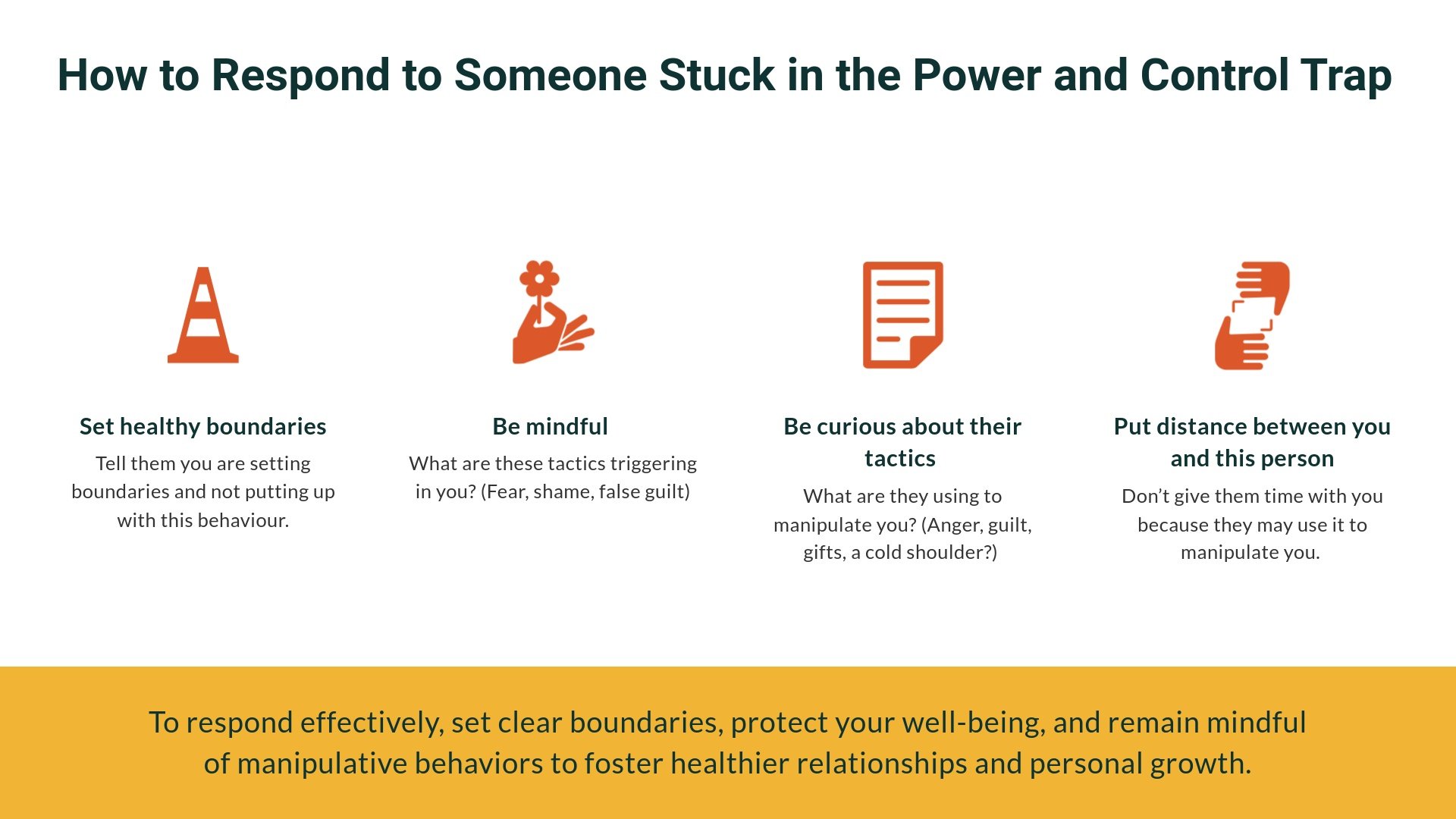Power and Control Complex Trauma Prisons
“The lust for power is not rooted in strength but in weakness. It is the expression of the inability of the individual self to stand alone and live. It is the desperate attempt to gain secondary strength where genuine strength is lacking.”
– Erich Fromm
Those trapped in a prison of power and control will prioritize power and control over people. They believe that controlling their outer world will bring structure and order to their inner world and heal the wounds inflicted on them as a child. This is someone addicted to the rush they feel when someone obeys or adores them. They may create fantasies of being in power or getting revenge, or pre-planning their moves over time until they move up in authority. They may use their beauty/sexuality as a means of controlling others.
Core belief: If I have power and control over my external world:
I will solve my shame
I will meet all my needs
I won’t need to trust anyone for anything
No one will abandon me because I control everyone’s actions
I won’t be anxious or afraid because I will control the details in my life
Origins:
Feelings of helplessness and weakness during childhood, especially when unable to meet their own needs, protect themselves, or solve problems, often set the foundation for complex trauma (C-PTSD).
These individuals were controlled and manipulated by their parents
They were abused or bullied regularly
They were overwhelmed by shame and weakness
They had no control over decisions regarding their life
They may have fantasized about being a super hero with ultimate power who could fix all their problems or get revenge – this gave them hope for their future.
Characteristics of This Life Trap
Using intimidation or violence to control. They are competitive, demanding, critical, and like to dominate. They do not respect boundaries. They cannot accept no for an answer because it means they aren’t in control.
They like to control others’ first impression of them. They choose whether to appear kind, social, polished or intimidating and groom others to believe this. They work hard to manage and maintain their image of positions, status, power, and superiority. They will get the last word in any discussion.
They won’t let themselves get close to anyone unless they want to manipulate them.
Offer unsolicited advice / constructed criticism because they view receivers as weaker. They do not know how to be with others without giving advice.
They are always trying to compensate for ongoing feelings of powerlessness and impotence. They have a strong inner critic and berate themselves if they make small mistakes or miss small details. They have a deep fear of failure / losing control / fear of needing to trust others.
Convince themselves that they are the ‘winners / accomplishers / hard workers’. They hate feelings of vulnerability, weakness, or neediness.
Fear Mongrels: create worst-case-scenarios to create fear in others so they can step in as a savior. They like 'crisis’ because they take the position of hero.
They consider anyone who makes any kind of mistake to be stupid, lazy, and lacking in self-discipline.
They project internal turbulence and unwanted emotions onto others and blame others for conflict.
They are highly organized and obsessed about details. They like systems / routines. They have lots of personal rules, rituals, and ceremonies. They “over-plan” simple activities. Micro-manage others and take the lead on projects. Do tasks themselves instead of delegating. Their way or the highway – choosing to do something different than them is choosing to do it wrong. Redo the work of others because it wasn’t done well enough.
They ‘keep score’ every time you slight them so they can remind you. They gain dirt on others for future blackmail opportunities.
Pressure others to change into what they need them to be to benefit from them. Struggle to maintain any kind of relationship because people get tired of being controlled.
They become irritable, anxious, or angry when events don’t begin on time, things don’t happen as planned, or when something or someone makes them late.
Ambiguity or ‘playing a situation by ear’ / ‘let’s see what happens’ makes them feel like they aren’t in control because they can’t predict what will happen.
Use sexuality and charm to gain power.
They are a helicopter parent / smotherer.
They are backseat drivers, telling others when the traffic light has changed, which route to take, when to turn, where to park.
They fight to control what to watch on TV, and get very irritable when someone else has the remote.
They find it hard to relax because they are driven to keep pressing forward in their work, never stopping.
They don’t see the damage their behavior causes and are in denial about their behaviors, emotions, and internal world.
Extreme Forms of Control
They need to control their intimate partner’s life:
Who they see
How much time they spend with their family
Control over activities, cutting out certain people
Gaslighting: They use gaslighting to make their partner question everything and doubt everyone else
Extreme jealousy: They experience intense jealousy if their partner speaks to anyone else
Justifying the Need for Control
They often justify their need for control with statements like:
“I just like things to be done right.”
“I’m just very responsible.”
“Somebody has to take charge.”
“I’m a Type A personality.”
Consequences of This Life Trap
Unfulfilled, strained relationships, rebellion, shame.
Emptiness and dissatisfaction: They are never satisfied and continue chasing the next rush of power.
Relationship breakdown: Their actions lead to stress and conflict, which cause their relationships to break down.
Children’s rebellion: Their children may begin to rebel as they grow tired of the control.
Shame reinforcement: Losing control of their external world feeds their internal shame.
How to respond to someone in this life trap
Set boundaries, protect self.
Set healthy boundaries
Tell them you are setting boundaries and not putting up with this behavior. Then call them out when they disrespect your boundaries
Put distance between you and this person / don’t give them time with you because they may use it to manipulate you.
Be curious about their tactics
What are they using to manipulate you? (Anger, guilt, gifts, a cold shoulder?)
Be mindful
What are these tactics triggering in you? (Fear, shame, false guilt)
Accept that the relationship will never be healthy
Being manipulated by them will cause you to become dysregulated and fall back into unhealthy habits like people-pleasing, fear of conflict and defiance
If your boss uses power and control: Ask yourself whether their requests trigger or disrespect you.
If you keep saying yes to things that do, the consequences of this choice will slowly destroy you.
If you say no, realize that you may get fired but accept that this is a better alternative for your long-term healing journey
HEALING
Begin to understand and connect with the feelings of helplessness you felt as a child.This will give you insight into where your hunger for power and control began.
Recognize that power and control will not meet all of your needs.
Heal your inner world of fear and shame. Know that you can sit in this discomfort and learn to tolerate it, otherwise you will need to continually depend on external power for your sense of worth.
When you feel like losing control will result in worse-case scenarios ask yourself:
How likely is that to happen?
What evidence do I have to support this?
Is focusing on the negatives and discounting all the positives really benefiting me or my relationships?
When you sense an impulse to start manipulating others ask yourself:
What’s going on?
Did something trigger my shame or fear?
Focus on soothing your inner world by managing your thoughts and beliefs in times of uncertainty.
Learn to listen to what other people think and say. Realize that other people’s backgrounds and experiences have taught them perspectives and actions that you may not be familiar with yet - you can receive helpful advice and gain new knowledge.
Learn what's you part and what's others’ part. With your partner, boss, coworkers and friends learn to separate what is yours to control and what is theirs to control.
Take practical steps to delegate tasks to others. Don't run around and check up on the person constantly, but rather trust that they're going to do it. This will be difficult, but it is so important.
Make a decision to completely give up control in one every area of your life. Start small, like letting someone else be in charge of the remote control when you’re watching TV, or choosing not to be a backseat driver.
Know that you can change and learn to deal with your fears and false beliefs. You can learn to trust and receive guidance from others. And you can learn to have healthy intimacy with others. Remember: you won’t change this overnight. Be patient with yourself. Gradually you're going to see more and more change and growth happen.
Coaching yourself can sound like:
I need clear boundaries where I end and they begin. I can't control them. I can't do their job for them. I have to let them have autonomy. I have to let them make decisions. I have to make sure they do their part and I do my part. I'm not going to obsess about it. I'm not going to try to gain control. I just have to let it go.
This is where true Joy and happiness comes from.
And you can get there.
Begin Your Healing Journey
Are you ready to embark on your path to healing from power and control dynamics? Join the ALIGN WITH YOURSELF course. This course is specifically designed to help you understand the origins of your behaviors, connect with your true self, and heal from complex trauma (C-PTSD). Take the first step towards healing by enrolling today: here



